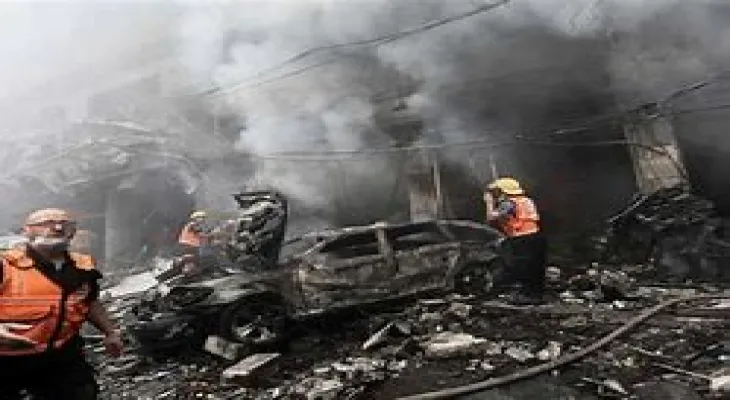Search here
Newspaper
Search here

Arab Canada News
News

Published: December 5, 2023
A senior Israeli commander said that Israeli forces, supported by warplanes that dropped hundreds of bombs and other munitions, are fighting the fiercest day of combat since their invasion of Gaza began.
General Yaron Finkelman, commander of the Southern Command of the Israeli Defense Forces, said on Tuesday: "We are in the most intense day since the start of the ground operation."
He added that the forces are fighting in Jabalia north of Gaza City and Shujaiya east of the city, and are now also fighting in Khan Yunis in the south of the Strip, "We are in the heart of Jabalia, in the heart of Shujaiya, and now also in the heart of Khan Yunis."
After days of ordering residents to flee Khan Yunis, Israeli forces dropped new leaflets on Tuesday containing instructions to stay inside shelters during the attack.
The leaflets addressed to residents of six neighborhoods constituting about a quarter of Khan Yunis city read: "In the coming hours, the Israeli Defense Forces will begin an intensive attack on your residential area to destroy the terrorist Hamas organization. For your safety, stay in the shelters and hospitals where you are. Do not go out, going out is dangerous, you have been warned."
The Israeli army took control of the northern half of the Gaza Strip last month. Since the end of a week-long truce on Friday, it has expanded the ground campaign to achieve its goal of eliminating Hamas rulers.
UNICEF said that the few small areas Israel has designated as "safe" are insufficient for the hundreds of thousands of people who are in desperate need of shelter.
James Elder, a UNICEF spokesperson, said after visiting Gaza, "These are small patches of barren land or corners of streets, they are sidewalks, they are half-completed buildings, there is no water."
At Nasser Hospital main in Khan Yunis, the wounded arrived in ambulances, a car, a flatbed truck, and a donkey cart after what survivors described as a raid that hit a school used as a shelter for displaced persons.
Inside the ward, the wounded occupied almost every inch of floor space, and paramedics rushed from patient to patient as their relatives wept.
A doctor carried the small body of a dead boy wearing a tracksuit and placed him in a corner with his arms spread out on the blood-stained tiles. On the floor beside him lay an injured boy and girl, surrounded by bandages and rubber gloves, their limbs intertwined with IV stands carrying intravenous fluids between their arms.
Two little girls were being treated, still covered in dust from the collapse of the house where their family was buried, and one of them said tearfully: "My parents are under the rubble." "I want my mom, I want my mom, I want my family."
Outside, men were carrying bodies wrapped in white and bloodstained shrouds to transport them to funerals. About ten bodies were lying on the ground. Five or six people were transported in a motorcycle cart.
Gaza Ministry of Health spokeswoman Izzah Al-Qudra said at least 43 bodies had already arrived at Nasser Hospital that morning and dozens more are feared trapped under rubble or in unsafe places for ambulances to retrieve them.
He added that, "Hospitals in southern Gaza Strip are completely collapsing and cannot handle the quantity and quality of injuries arriving at them."
Since then, unprecedented Israeli bombardment of the Gaza Strip has displaced 80 percent of the 2.3 million population, most of whom are now gathering in the southern areas now on the front line.
According to Gaza health officials deemed credible by the United Nations, more than 15,900 deaths have been confirmed, with thousands more missing and feared buried under rubble.
Israel says responsibility for damage to civilians lies with Hamas fighters who operate among them, including through underground tunnels that can only be destroyed with massive bombs. Hamas denies this.
But Washington has urged its close ally to make greater efforts to reduce civilian harm in the next phase of the war, launched by Israel in response to an attack carried out by Hamas fighters on October 7 who stormed towns, killing 1,200 people and taking 240 hostages, according to Israeli counts, including some Canadians among the dead.
The United States is providing significant military aid to Israel, and has deployed two carrier strike groups in the eastern Mediterranean since October 7, but some progressives in Capitol Hill believe the aid should be conditional.
Vermont Senator Bernie Sanders, an independent who caucuses with Democrats in the Senate, said: "I do not believe we should give $10.1 billion to Netanyahu’s far-right government to continue its current military approach," adding: "What Netanyahu’s government is doing is immoral, violates international law, and the United States should not be complicit in those actions."
In Tel Aviv, government spokesman Levi said Israel is open to "constructive feedback" on reducing harm to civilians as long as the advice aligns with its aim of destroying Hamas.
Meanwhile, U.S. aid official Samantha Power arrived in the Egyptian Sinai Peninsula on Tuesday, where she is expected to announce additional aid exceeding $21 million to the Palestinian people, according to a spokesperson for the U.S. Agency for International Development to Reuters.
USAID spokeswoman Jessica Jennings said Power arrived in Arish carrying 36,000 pounds of food aid and medical supplies flown in by the Department of Defense from Jordan and headed to Gaza.
Comments